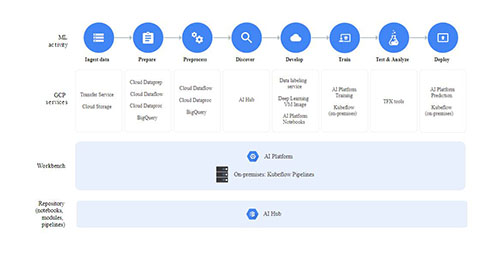Google Launches New AI Platform, Machine Learning Tools
This week via its Cloud Next 2019 conference in San Francisco, Calif., Google made several artificial intelligence (AI) and machine learning-related product announcements, including one for its brand-new AI Platform for Google Cloud.
AI Platform lets machine learning professionals "take their ML projects from ideation to production and deployment, quickly and cost-effectively" for "build[ing] and run[ning] your own machine learning application" either on-premises or within Google Cloud, and to make it relatively easy to switch back and forth, the company said.
One of the big features of AI Platform is its native integration with Google's existing suite of popular machine learning tools, including TensorFlow.
It runs on Kubeflow, a machine learning toolkit for Kubernetes.
Google released the graphic below showing how AI Platform can now support the entire development lifecycle for developers' machine learning projects:
 [Click on image for larger view.] Google's AI Platform Ecosystem
[Click on image for larger view.] Google's AI Platform Ecosystem
As part of the new suite of products designed to support AI product development and collaboration (as shown in the graphic above), Google also announced AI Hub, also shown on the graphic above, which it referred to as "the one stop for everything AI."
"Google Cloud's AI Hub is a hosted repository of plug-and-play AI components, including end-to-end AI pipelines and out-of-the-box algorithms," the company explains on the AI Hub main Web site. "AI Hub provides enterprise-grade sharing capabilities that let organizations privately host their AI content to foster reuse and collaboration among machine learning developers and users internally. You can also easily deploy unique Google Cloud AI and Google AI technologies for experimentation and ultimately production on Google Cloud and hybrid infrastructures."
AI Hub is currently in beta format. Public resources on the AI Hub can currently be found here, and can be located by asset type (Kubeflow pipeline, TensorFlow module, trained model, virtual machine image, et cetera), data type (image, text or other) and machine learning workflow (data preparation, training, data gathering, deploying).
Another big announcement from Cloud Next 2019 is Google's release of Cloud AutoML, its new tool to help developers more easily train custom-created high-level machine learning models.
Cloud AutoML "relies on Google's state-of-the-art transfer learning and neural architecture search technology" to let "developers with limited machine learning expertise to train high-quality models specific to their business needs," the company said.
It features an "easy-to-use" graphical user interface and Google says that developers can get custom models deployed in "a few minutes." The company also offers a "human labeling service" -- people to help annotate and clean up your data labels for better training and output.
Cloud AutoML consists of five distinct modules, depending on the content being worked with:
Documentation for Cloud AutoML (also called just AutoML) can be found here.
About the Author
Becky Nagel serves as vice president of AI for 1105 Media specializing in developing media, events and training for companies around AI and generative AI technology. She also regularly writes and reports on AI news, and is the founding editor of PureAI.com. She's the author of "ChatGPT Prompt 101 Guide for Business Users" and other popular AI resources with a real-world business perspective. She regularly speaks, writes and develops content around AI, generative AI and other business tech. She has a background in Web technology and B2B enterprise technology journalism.